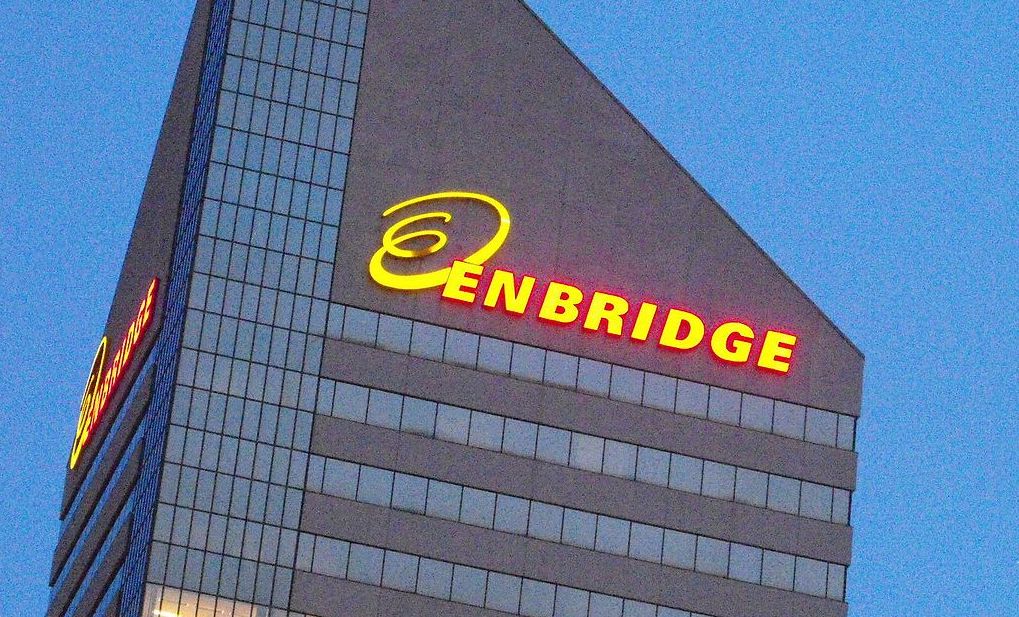Minnesotans for Line 3, a group established last year to advocate for an Enbridge oil pipeline project, presents itself as a grassroots organization consisting of “thousands of members.”
But a DeSmog investigation has found that behind the scenes, the Calgary-based energy giant is pulling the strings. Enbridge has provided the group with funding, public relations, and a variety of advocacy tactics.
The investigation has also found that a public relations firm behind the operation recently tried to erase its ties to Enbridge.
Facebook Splurge and Secret Tactics
Minnesotans for Line 3 first appeared in the battle over Enbridge’s Line 3 Replacement Project early last year.
Opponents, who this week employed direct action tactics to block initial work on the project and delivered a petition to Minnesota Governor Tim Walz, include several Native communities — among them the White Earth and Mille Lacs Bands of Ojibwe and the Red Lake Band of Chippewa. Of their main concerns, these groups cite violation of Indigenous rights, risks associated with oil spills, and climate change impacts.
Through a series of TV ads and op-eds, along with a social media campaign and a petition delivered to state authorities, Minnesotans for Line 3 called for approving Enbridge’s multi-billion dollar plan to replace and reroute its aging pipeline that transports Canadian tar sands oil through North Dakota and Minnesota to Superior, Wisconsin.
The group spent considerable funds on Facebook advertising, making it the tenth largest digital ad purchaser among interest groups between November 2018 and April 2019. And it allegedly engaged in more stealthy tactics as well: Dozens of young people wearing Minnesotans for Line 3 shirts occupied spots in a line at a state Public Utilities Commission (PUC) hearing on the project at the expense of the project’s opponents – only to disappear shortly after receiving the tickets.
The PUC’s eventual approval of the project suffered a partial reversal this week, after the Minnesota Court of Appeals ruled that the pipeline’s environmental impact statement did not adequately address the potential impact of an oil spill in the Lake Superior watershed. That review will likely be sent back to the PUC to determine how to proceed.
Enbridge Behind TV Ads
Formally, Minnesotans for Line 3 says it was established by Bob Schoneberger, the former founder and CEO of United Piping, an Enbridge construction contractor. Schoneberger, who died unexpectedly from a heart attack last November, worked previously for Lakehead Pipeline, Enbridge’s early incarnation.
Minnesotans for Line 3’s website makes no mention of any affiliation with Enbridge, and other than United Piping, lists two other construction companies — JR Jensen Construction and Gordon Construction — on its advisory council.
But Federal Communications Commission (FCC) filings reviewed by DeSmog reveal that Enbridge is behind the TV ads for the group. The filings, which require parties placing political issue ads to list their officers or directors, name, along with Schoneberger, three Enbridge executives, including its president and CEO Al Monaco.
Another FCC filing shows that Velocity Public Affairs, a Saint Paul-based public relations firm, placed one of the ads.
Mike Zipko, one of the firm’s principals and former registered lobbyist in Minnesota, has been representing Enbridge for years and appeared on several occasions in the past year as a Minnesotans for Line 3 spokesman.
Covering the Tracks
Yet Velocity recently tried to obscure the work it does for Enbridge.
In a now deleted page from its website, which DeSmog discovered as a cached webpage (and archived here), the firm details its “invaluable” grassroots work it provided Enbridge on the Line 3 project through a service it calls “Advocacy Elevator.”
“To garner favorable decisions by government agencies that would decide the fate of the project, Enbridge needed an exceptional and sustained show of statewide public support,” the now-deleted page says. “Enbridge tapped the Advocacy Elevator’s power to develop uniquely comprehensive sets of data that were the foundation to better define and understand a universe of people more likely to support the project and to take action.”
Afterwards, the description continues, Velocity used a variety of tactics, including a phone program, direct-mail, digital and content engagement, and canvassing to create grassroots support. “All of this was focused on the objective of further identifying the strongest group of likely supporters and then getting them to ‘walk the walk’ by taking actions that would create an impact with specific audiences that would, in turn, support approval of the line.”
The firm’s current “Advocacy Elevator” webpage makes no mention of Enbridge, and instead presents a generic description of the services it provides clients through that particular product.
Mike Zipko did not respond to a request for comment. Similarly, Enbridge did not respond to a series of questions about its role with Minnesotans for Line 3.
Honor The Earth, No Line 3 sign outside the Minnesota Public Utilities Commission hearing on Enbridge’s Line 3 in downtown St. Paul, June 18, 2018. Credit: Lorie Shaull, CC BY–SA 2.0
Abby Loucks of United Piping did not answer questions about Enbridge’s involvement in the group, and instead repeated the information posted on its website. “Bob Schoneberger created MN4L3 [Minnesotans for Line 3] because he saw first-hand how projects like Line 3 create and support jobs in communities across Minnesota,” she said. “Our members are people across Minnesota who share this same goal. They are people who continue to take actions to encourage regulators, elected officials, and others to keep the process moving.”
“Our goal has always been to make sure Line 3 is successful and we do not apologize for being passionate advocates,” Loucks added.
But Frank Bibeau, an attorney with Honor the Earth, a Native-led group opposing the pipeline and one of the appellants against the PUC, thinks that such front groups are deceptive. “It’s big oil and it’s what they do,” he said. “They’ve been engaged in subtle misinformation — for example recently claiming in an op-ed that the project will bring oil to the Twin Cities. The problem is: it won’t do that; it goes to Lake Superior. But people often don’t know the details and just think ‘this will benefit Minnesota.’ So it’s deceptive, a kind of propaganda that makes it look like ordinary citizens are backing this. It’s sad, really.”
Not the First Front Group
Minnesotans For Line 3 is not the first front group involved in the battle over the pipeline replacement project, which was first proposed in 2014.
In 2017, the Consumer Energy Alliance (CEA), an Enbridge-funded arm of the lobbying firm HBW Resources, created a campaign titled “Modernizing America.”
CEA ran two TV ads in Minnesota in support of the pipeline.
Modernizing America’s webpage then cited a University of Minnesota Duluth (UMD) study that concluded the project will create 8,600 jobs. But as the watchdog group Public Accountability Initiative revealed, Enbridge provided the data inputs for the study and funded the entity that commissioned it from UMD.
Main image: Enbridge Building, downtown Edmonton, Alberta. Credit: Verne Equinox, CC BY 3.0
Subscribe to our newsletter
Stay up to date with DeSmog news and alerts









